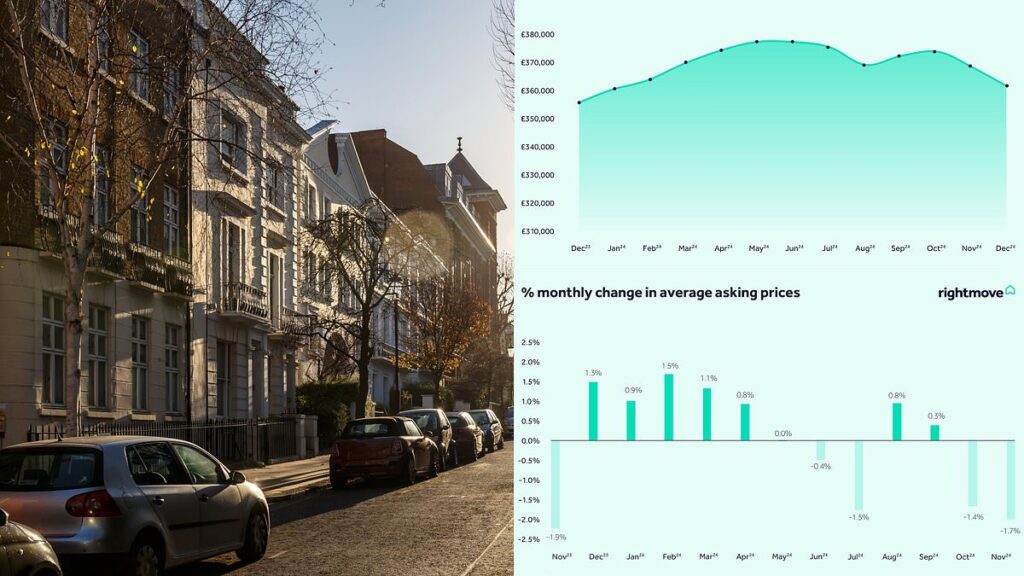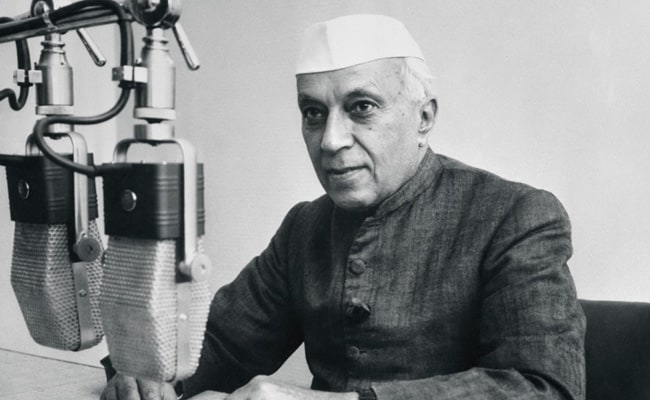Newly listed house asking prices have fallen by almost £12,000 over the last two months, Rightmove data shows.
The average asking price fell for the second month in a row in December, going from £366,592 to £360,197, a drop of 1.7 per cent.
This follows from the previous month, which saw average asking prices fall £5,366 between October and November equating to a drop of 1.4 per cent.
This means over the past two months, the typical newly listed asking price has fallen by £11,761.
While this sounds like a big fall, it is broadly in line with the seasonal norm in the run up to Christmas, according to Rightmove.
This is because buyers’ tend to put their plans on hold until the new year with sellers’ pricing power diminishing as Christmas approaches.

Tough sell: New sellers typically need to come to market with some of the most competitive prices of the year in December, to motivate festivity-distracted buyers to act
However, despite the festive lull, activity remains substantially stronger than the same period a year ago, according to the property portal.
It says the number of sales being agreed is up by 22 per cent, and new buyer enquiries is up by 13 per cent.
Tim Bannister, a property expert at Rightmove said: ‘New sellers in December have to work particularly hard to capture the attention of Christmas-party and festivity-distracted buyers, and the 1.7 per cent average monthly fall is a fitting gift for those who are still buying homes rather than presents.
‘Despite this monthly drop, prices have risen compared with this time in 2023, broadly in line with our prediction of a 1 per cent rise in prices this year.’
There is also evidence that some buyers are trying to beat the looming stamp-duty deadline on 31 March and sellers are reacting to this by choosing to go to market now.
Sellers of smaller properties in higher-priced areas are trying to trade up or just sell before the deadline to avoid the higher stamp duty charges, despite now needing to act very quickly.
This is because the threshold at which home movers start paying the tax is falling from £250,000 to £125,000 and means anyone purchasing a property over £125,000 will pay up to £2,500 more in stamp duty.
Prices are also holding up best in the first-time-buyer sector, especially homes priced below the £300,000 threshold.
In the last four weeks, the number of sellers of typical first-time buyer homes with one and two bedroom homes in London coming to market is up by 20 per cent, according to Rightmove, the most of any regional market sector.
In second place is the South East where one and two bedroom homes coming to market is up by 16 per cent, which is also the second most expensive region.
The price at which stamp duty will start to be charged on first-time buyer purchases will revert back to £300,000, from its current level of £425,000.
For first-time buyers, this could mean that instead of paying no stamp duty on a purchase worth £425,000, they will soon pay £6,205.
The costs get even higher for any first-time buyers purchasing a property worth between £425,000 and £625,000.
A first-time buyer buying a home worth £625,000 currently pays £10,000 in stamp duty. But from 1 April, that will rise to £21,250 – an increase of £11,250.
Interestingly, prices are holding up most strongly for first-time-buyer type properties in more affordable areas, which are set to be less affected by the stamp duty changes, as most first-time-buyer homes are well under the resuming £300,000 tax threshold.
Prices for typical first-time-buyer homes in the North East are up by 1 per cent this month, starkly contrasting this month’s national 1.7 per cent fall across all property types.
Take advantage of the Boxing day boom?
Last year, boxing day saw a record number of new sellers launching to the market for that time of year, providing fresh property choice for buyers.
Meanwhile, buyer enquiries jumped by 273 per cent between the Christmas Day lull and Boxing Day.
Tim Bannister of Rightmove is expecting a similar story to play out this year.
‘We are now looking ahead to the traditional Rightmove Boxing Day bounce in home-mover activity, which has increasingly become a key date in the housing market calendar,’ he said.
‘Each year, our real-time data can pinpoint the exact moment that the turkey is finished, family games run out of steam, mobile devices are picked up, and prospective movers flood onto Rightmove and get their 2025 move started.
‘If this year is anything like recent years, those early birds who get their search started the day after the festivities are over are likely to be rewarded with plenty of fresh property choice to consider.’
Steven Holden, director at Holden Copley estate agents in Nottingham added: ‘Naturally, December brings a seasonal slowdown in new listings as many shift their focus to the festivities.
‘However, we expect the traditional post-Christmas surge in activity to kickstart the new year, with Boxing Day marking the beginning of a busy period.
‘Getting a valuation now or early January will help put prospective sellers in a strong position to take advantage of buyers who are actively seeking correctly priced properties.’
How to find a new mortgage
Borrowers who need a mortgage because their current fixed rate deal is ending, or they are buying a home, should explore their options as soon as possible.
Quick mortgage finder links with This is Money’s partner L&C
> Mortgage rates calculator
> Find the right mortgage for you
What if I need to remortgage?
Borrowers should compare rates, speak to a mortgage broker and be prepared to act.
Homeowners can lock in to a new deal six to nine months in advance, often with no obligation to take it.
Most mortgage deals allow fees to be added to the loan and only be charged when it is taken out. This means borrowers can secure a rate without paying expensive arrangement fees.
Keep in mind that by doing this and not clearing the fee on completion, interest will be paid on the fee amount over the entire term of the loan, so this may not be the best option for everyone.
What if I am buying a home?
Those with home purchases agreed should also aim to secure rates as soon as possible, so they know exactly what their monthly payments will be.
Buyers should avoid overstretching and be aware that house prices may fall, as higher mortgage rates limit people’s borrowing ability and buying power.
How to compare mortgage costs
The best way to compare mortgage costs and find the right deal for you is to speak to a broker.
This is Money has a long-standing partnership with fee-free broker L&C, to provide you with fee-free expert mortgage advice.
Interested in seeing today’s best mortgage rates? Use This is Money and L&Cs best mortgage rates calculator to show deals matching your home value, mortgage size, term and fixed rate needs.
If you’re ready to find your next mortgage, why not use L&C’s online Mortgage Finder. It will search 1,000’s of deals from more than 90 different lenders to discover the best deal for you.
> Find your best mortgage deal with This is Money and L&C
Be aware that rates can change quickly, however, and so if you need a mortgage or want to compare rates, speak to L&C as soon as possible, so they can help you find the right mortgage for you.
Mortgage service provided by London & Country Mortgages (L&C), which is authorised and regulated by the Financial Conduct Authority (registered number: 143002). The FCA does not regulate most Buy to Let mortgages. Your home or property may be repossessed if you do not keep up repayments on your mortgage
Some links in this article may be affiliate links. If you click on them we may earn a small commission. That helps us fund This Is Money, and keep it free to use. We do not write articles to promote products. We do not allow any commercial relationship to affect our editorial independence.










